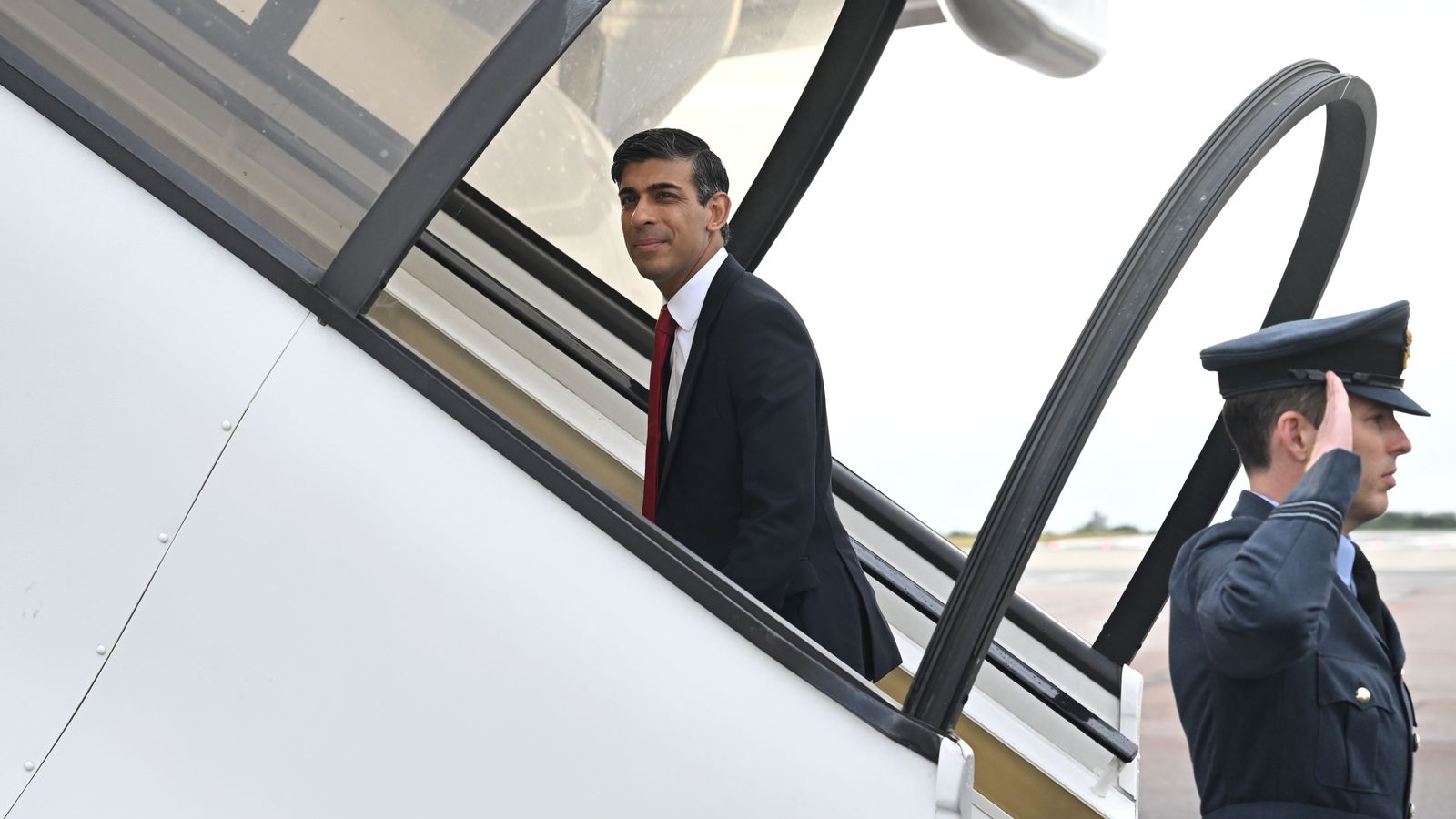With difficulties at home growing and the gap in the polls widening, the latest NATO summit in Vilnius at least gives Rishi Sunak some space to tell a positive story about international cooperation, statesmanship and leadership on Ukraine.
One of the two big demands being pushed for by the prime minister has already been agreed after Turkey’s leader President Erdogan last night dropped his opposition to Sweden joining NATO.
The second will be to reiterate the need to strengthen NATO and support Ukraine, as he presses fellow member states to commit to the target of spending 2% of their GDP on defence.
Again, on this, the UK has a strong story to tell as one of only 11 of the 31 NATO members currently fulfilling this pledge. France and Germany both missed the target last year, while Mr Sunak has promised to boost defence spending by £5bn over the next two years
The third big theme of this trip will be the question of when Ukraine should be able to join the alliance.
President Zelenskyy is pressing allies to provide his country with a timeline towards membership. The UK, Poland and the Baltic states want to see more vocal support for Kyiv’s eventual membership, but Washington and Berlin are taking a more cautious stance.
Politics Hub: Sunak arrives in Vilnius for NATO summit – latest updates
BBC presenter suspended: Rishi Sunak says allegations ‘shocking’ but confident ‘rigorous’ investigation under way
Joe Biden says US-UK relationship ‘rock solid’, despite disagreements over Ukraine
Joe Biden to meet Rishi Sunak for Ukraine talks and have tea with the King during UK visit
“There’s a spectrum of views within the alliance,” says one senior British figure. “You’ve got some who, particularly on the eastern flank, would like it to happen very quickly, as a pathway and you have got others who venture to have been a bit more cautious about it, but I think we’re starting to look toward to move toward a consensus positive outcome…I think there will be a very positive political signal.”
With some unwilling to offer Ukraine firm guarantees or any timeline in the middle of a conflict, NATO Secretary General Jens Stoltenberg has suggested members could offer Ukraine a fast-track route after the war has ended – perhaps removing the need for a membership plan in order for quick entry, as happened with Sweden and Finland when they applied to join NATO last year.
Vilnius is then a place where the British PM feels he can make some progress, and he needs a good story to tell because back home the situation is really troubling.
At the annual summer drinks parties in Westminster, Conservative MPs seem to have given up, as they mutter about inevitable defeat at the next general election.
A few months back, I could find MPs who were convinced that Mr Sunak could edge back into this race ahead of a general election, now I cannot find one as the chaos of Boris Johnson continues to bite at his successor and the economic outlook worsens for the PM.
One cabinet minister told me recently Rishi Sunak’s head seems to be “dropping a bit” – weighed down by the difficulties he is encountering in the delivery of not just one but all of his five pledges.
Read more:
Why Sunak and Biden are struggling to keep the spark of the special relationship alive
PM ‘discourages’ use of cluster bombs after US agrees to send controversial munitions to Ukraine
Ukraine’s rapid accession to NATO unlikely despite major lobbying effort by Kyiv
What looked easy – or at least doable – at the start of the year now really doesn’t. The inflation he promised to halve remains stubbornly high. The debt pile is growing not reducing, and economic growth by the year’s end is in no way assured. NHS waiting lists meanwhile are growing, and the number of small boats remains high – with well over a 1,000 people crossing the channel over the weekend. “The universe seems to be against him,” remarked one cabinet minister ruefully. “He’s going to do all of the right things and get none of the credit”.
He also has the matter of three by-elections just ahead of parliament’s summer recess, all of which the Tories fear they will lose – an ignominy which would represent the worst one-day result for a ruling party in half a century.
One MP who had been canvassing in Selby and Ainsty, the constituency vacated by the resignation of Nigel Adams, where the Tories have a 20,000 majority, told me the atmosphere was “dire.”
“It’s like a bin fire, the doorstep was awful, people are angry. That’s the mood.”
A series of bilateral meetings with world leaders and a summit likely to see a strengthening of NATO’s support for Ukraine should allow the prime minister to find some comfort in cementing the UK’s standing with allies after the bumpy Brexit years, but progress here really doesn’t seem to be helping him back home.







